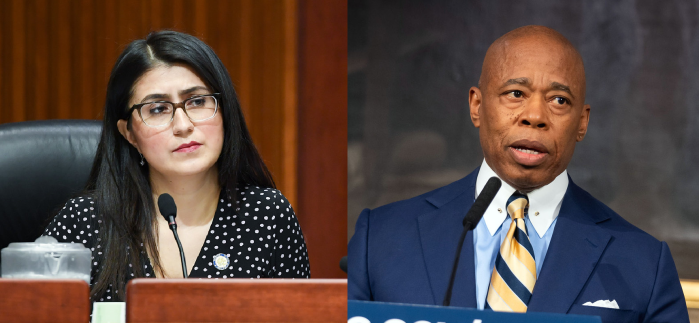By Thomas Tracy
Instead of demanding everyone fork over their green to ease congestion in the city, Mayor Michael Bloomberg should focus on something more…yellow. That was the proposal many southern Brooklyn legislators signed onto last week as they thumbed their noses at the city’s current congestion pricing plan to charge every motorist $8 or more to go into Manhattan, opting instead to putting the brunt of the funding on the shoulders of the Taxi and Limousine Service (TLC). In a proposal created by Westchester Assemblymember Richard L. Brodsky, the city could dramatically reduce congestion in Manhattan, improve air quality, fund mass transit and qualify for the federal funding the Bloomberg administration is seeking by increasing taxi fares, as well as traffic enforcement summonses in the city. But for the plan to work, the TLC would have to increase their “drop charge” from $2.50 to $6.50, according to the proposal. “Given the fact that for-hire vehicles are the single greatest contributor to congestion in New York City and the fact that many New Yorkers use taxi cabs instead of easily available mass transit, any successful plan to reduce congestion must include them,” Brodsky explained in his proposal, which was approved by a 30-member legislative commission that included Brooklyn Assemblymembers William Boyland (D, Bedford Stuyvesant), William Colton (D, Besonhurst) Darryl Towns (D, East New York), Nick Perry (D, Canarsie) Hakeem Jeffries (D, Fort Greene), Alan Maisel (D, Mill Basin), City Councilmember Lew Fidler (D, Mill Basin) and State Senator Diane Savino (D, Bensonhurst). All of them, except Jeffries, are southern Brooklyn legislators who said that they do not see the $8 congestion pricing fee benefiting their constituents. Brodsky’s plan estimated that between $362 and $372 million will be raised annually by upping taxi fares and parking summonses from the tip of Manhattan to 60th Street. There will also be a reduction in congestion between 4.6 and 5.8 vehicle miles traveled (VMT) and a 10.6 percent reduction in Time of Travel (TOT) – two factors Washington D.C. will evaluate before they fork over the $354.5 million to improve traffic congestion in the city. If the City Council approves the Mayor’s congestion pricing plan, an $8 fee will be levied on any private vehicles coming into the city from the tip of lower Manhattan to the foot of Central Park weekdays between 6 a.m. and 6 p.m. Trucks will be charged $21. Taxi cabs and livery vehicles will be given liberty to go back and forth into the congestion zone without paying anything. Neither would motorists from New Jersey, who will only have to pay the usual tunnel fare to get into the city, opponents to the Mayor’s plan claim. TLC officials balked at Brodsky’s idea, claiming that an increase in taxi fare would put hundreds of taxi cab drivers out of work. “[Brodsky’s] is a solution that is far better than the congestion pricing scheme which will divide New Yorkers into haves and have-nots,” stated Fidler, who has been pitching his own congestion pricing plan over the last few months. “Congestion pricing is nothing more than a middle income tax, especially when you consider that driver’s from New Jersey don’t have to pay it,” said Maisel. “Yet 45 percent of the congestion in the city is brought on by taxi cabs and we don’t do anything about them. And who are the ones who use them regularly? People with incomes of $150,000 or more. Why should they get off the hook.” Despite the argument the proposal raises, the city is sticking with their congestion pricing plan, which must be approved by the city and state legislature by the end of this month.

































